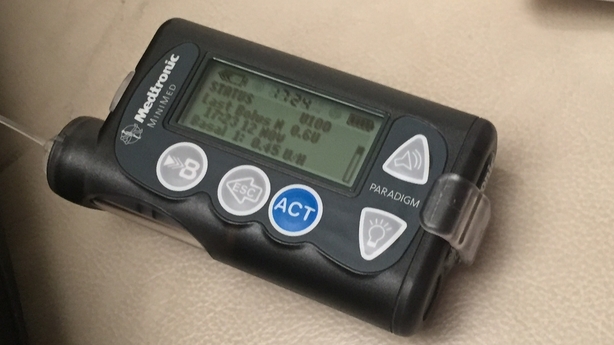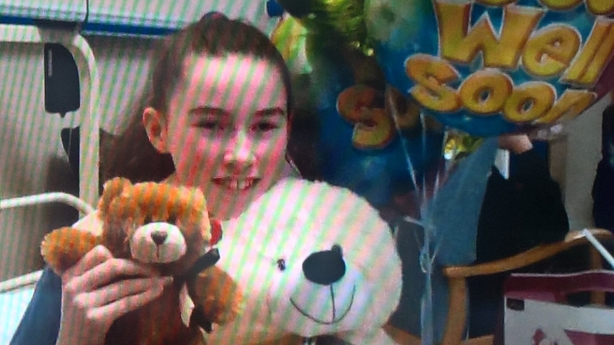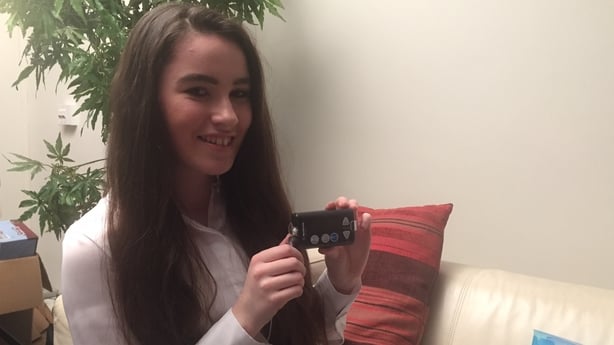Nearly a quarter of a million people in Ireland have diabetes and doctors are seeing a rise in the number of people being diagnosed with type 1 diabetes.
Many people might assume that type 1 diabetes is the result of an unhealthy lifestyle over a long period of time. However, this is not the case, writes Mark O'Flynn on World Diabetes Day.
According to Diabetes Ireland approximately 225,000 people in Ireland have diabetes, 10%-15% of this number has type 1.
This type of diabetes is an autoimmune condition that can develop over days and weeks, and is in no way linked to a person's diet. It mainly occurs in children and young adults.
We need your consent to load this rte-player contentWe use rte-player to manage extra content that can set cookies on your device and collect data about your activity. Please review their details and accept them to load the content.Manage Preferences
Health promotion and research manager at Diabetes Ireland Dr Anna Clarke describes type 2 as "an epidemic in Ireland."
"We have thousands of people being diagnosed with diabetes, probably about 10,000 a year as opposed to type 1 diabetes where you have about 250 being diagnosed each year," she said.
She said in total, there are 3,000 children with type 1 diabetes, while in total there is between 15-20,000 adults and children with the condition.
Dr Clarke said a person with type 1 diabetes "will be noticeably thirsty, going to the toilet much more frequently, will lose weight quite rapidly and will get very tired.
"For people we say: If your child is not well and you bring it to a professional, ask for the child to be checked for type 1 diabetes because it is only a urine or a finger-prick test. Rather than letting it get more serious."
She said that if a person has the condition and is not getting the insulin that is needed, then they can become "critically ill".
Dr Clarke said: "We would say out of six cases of people being newly diagnosed, more than half of those have a delayed diagnosis.
"If it gets more serious ... they will progressively get more tired, go unconscious and then their breathing will be affected and it is a term known as diabetic ketoacidosis (DKA).
"They are critically ill because they have no glucose in their body being broken down and they are using so much fat for energy that they have changed the acid base of their blood, and that affects their breathing."
Consultant Paediatric Endocrinologist at Temple Street Children’s Hospital Dr Nuala Murphy said that having type 1 diabetes is not as a result of a person's diet.
Speaking to RTÉ News, she said: "We don’t fully understand why people develop type 1 diabetes. It has a little bit to do with your genetic makeup and then a series of triggers, environment triggers, predominately viruses in the environment.
"But once they are diagnosed with diabetes, unfortunately they have to make a number of dietary changes to ensure that their blood glucose levels are kept in the normal range."
Dr Murphy said that 95% of all diabetic children being presented to paediatric services have type 1 diabetes. She said that she is seeing a rise in the incidence of this type of diabetes with the "greatest increase in children under five."
"Why exactly we are seeing an increase in type 1 diabetes is not fully understood and it is the focus of a lot of research. But thankfully we are seeing also improvements in our ability to manage the condition for this age group," she said.
Dr Murphy said that overall living with diabetes is extremely difficult but there have been a lot of advances in the last number of years which have made living with the condition a little easier.

"The first advances were really in newer insulins and they are continuing to evolve; better devices in terms of insulin injections and insulin pens, and much better pumps – devices which deliver insulin in a continuous delivery system.
"More recently the technology in terms of monitoring blood glucose levels has improved very dramatically."
'You haven't got time for an ambulance – you have to break lights'
During her mid-term break in February 2014, Lauren Smyth from Oldtown, Co Dublin rapidly lost a lot of weight. This greatly concerned her parents Bill and Fiona.
Ms Smyth said that a pattern was emerging with Lauren where she was rushing to the bathroom whenever she finished a meal.
"I also saw the gauntness in her face and these red cheeks emerging, but not with high temperature attaching," she said.
Ms Smyth said that she went to a rapid care clinic for a diagnosis and was told that Lauren had slapped cheek syndrome. At the time she felt somewhat relieved but said that deep-down she knew that there was something else wrong with Lauren, as her lethargy increased and her health continued to deteriorate.
She then booked an appointment with her general practitioner and said that the GP immediately knew that Lauren was very ill.
She said: "She made a call straight away to Temple Street Children’s Hospital. Now at that stage she didn't tell me what the diagnosis was, she just said 'You haven't got time for an ambulance – you have to break lights.'"
Dr Murphy and her team met Lauren and her mother at the hospital. Ms Smyth said that at this stage, Lauren had lost two stone "in a matter of days."
She said that when she explained what happened, Lauren was diagnosed with type 1 diabetes.
"And my first reaction was, 'When will she get better?'. And she [the doctor] said 'No this is for life', and I said 'For life?'"
Ms Smyth was then told that systems would be in place for Lauren to live with the condition.
However, she said "As a parent I was devastated because I personally couldn't fix it, for my child."
"Their analysis was that Lauren picked up a virus which shut down her pancreas, and she was just unfortunate in that respect. And we just had to live with that and move on."
Ms Smyth said that during Lauren's stay in hospital after her diagnosis, she wanted to remain positive and made a promise to her that they would "work together as a team to do all the normal things that any teenager or child can do - and that's exactly what we did!"

She advised any parents who find themselves concerned like she was when Lauren first became ill to "stay positive" and "get a second opinion".
For Lauren, monitoring her diet and blood sugar levels as well as daily insulin treatment have all become a part of her daily routine.
With recent advances in treatments for diabetes, she finds that she has a lot more freedom.
With the new diabetic insulin pump available, she no longer has to inject herself. Before, she had to inject her legs which meant that she was restricted in the clothing she could wear, which was mainly shorts.
"Now I can wear my jeans and my leggings and it's just absolutely brilliant, it means so much." she said.
Lauren said that different things with diabetes made her feel determined to achieve more in life. She is a keen violinist and was determined to further this and her academic studies.

Not only that, but Lauren also took part in this year's Dublin Women's Mini Marathon. She said that she gets great support from her friends at school in Dominican College, and her younger sister Caroline.
"I would just love to progress in things but nothing can stop anyone with diabetes. You can live your life with diabetes."
If you have any concerns or if you wish to find out more about diabetes, you can contact your GP or Diabetes Ireland on 1850 909 909, or visit www.diabetes.ie

